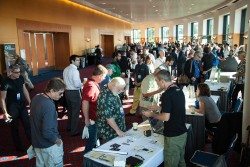
The Oregon Medical Marijuana Business Conference (OMMBC) is just over a month away. Attendees will get the latest info on both medical marijuana regulations and upcoming recreational regulations as the conference bridges the gap between the two Oregon systems. This is the fourth OMMBC, tickets are still available, but you should get them soon as the previous events in Ashland and Eugene sold out. While the OMMBC organizers (full disclosure: I’m one of them) have hosted an International Cannabis Business Conference (ICBC) in Portland, this is the first time that the OMMBC has ventured into the cannabis-friendly Rose City. I am greatly looking forward to the event as I love helping the cannabis community network and brainstorming with advocates about how we can keep improving our marijuana laws.
With the passage of Measure 91 last November, House Bill 3400 that altered both Measure 91 and the Oregon Medical Marijuana Program and Senate Bill 460, the landmark October 1st “early start” to recreational sales, there are new cannabis laws to brush up on for experienced marijuana industry entrepreneurs, let alone new business people looking to enter the market. Additionally, the Oregon Liquor Control Commission (OLCC) Rules Advisory Committee and subcommittee meetings are advising the OLCC on rules and regulations that will be finalized in a couple of months. Throw in the local zoning ordinances and outright bans, and it is clear that anyone in the industry, or thinking of joining the industry, would be wise to hear from cannabis industry lawyers and experts to learn the ins and outs of the Oregon marijuana industry landscape as well as information that will help any business, such as branding, employment law and how the media, both mainstream and alternative, covers stories.
For even the most experienced cannabis industry professional, I think that tax attorney Henry Wykowski may be the most important speaker at the conference. Wykowski is the foremost expert on cannabis 280e issues as his cases have established what the cannabis industry can and cannot deduct from federal taxes. Since the federal landscape regarding taxation should change, Congressman Earl Blumenauer will discuss his important work in Congress and how we can help him help us. Longtime cannabis attorneys Paul Loney and Leland Berger will be on hand to answer questions about local marijuana laws and regulations, including those pesky city councils and county commissions in locales that may not be as cannabis-friendly as Portland. Since politics must be your business if marijuana is your industry, the insight from Representative Ann Lininger and Senator Floyd Prozanski will be invaluable as they will discuss legislative changes and give us a glimpse into the future of cannabis legislation, along with some tips into how we can help them develop sensible marijuana laws that are effective for the entire state.
All of us organizing the OMMBC see a booming future for the Oregon marijuana industry as we follow in the footsteps of Oregon microbrewery and winery industries. However, we are all activists at heart and understand that keeping people out of prison for marijuana is our number one goal. Thus, we are honored to have Judge Jim Gray, a member of Law Enforcement Against Prohibition (LEAP) and former (and likely future) Libertarian Party vice-presidential candidate. A former criminal defense attorney, California Superior Court Judge and federal prosecutor, Judge Gray has been on all sides of the issue, including the industry as he is now a board member of Cannabis Sativa, Inc. Judge Gray has been one of our most effective Drug War reform advocates for more than three decades and we can all learn a lot from him as we move forward as an industry and as a movement.
In addition to all of the great information about the industry and activism, the OMMBC always provides great networking events and is just plain fun. I hope that you won’t miss this opportunity to join us at the OMMBC as we help take the Oregon marijuana industry into the future in a way that benefits all Oregonians and provides a model for the rest of the country to follow.






